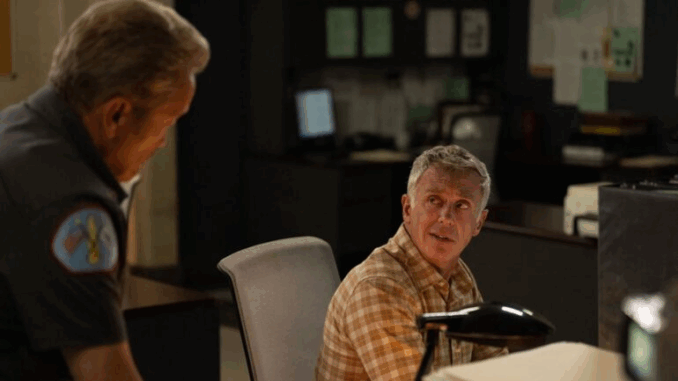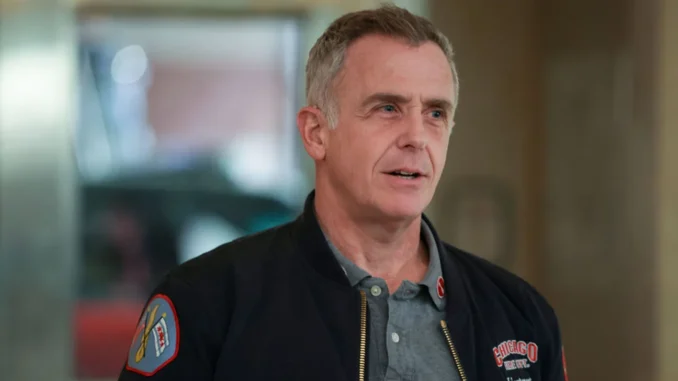
There are moments in Chicago Fire that stay with you long after the credits roll — not because of the flames or the rescues, but because of the quiet devastation that follows. Season 14 delivered one of those moments when Christopher Herrmann, the gruff yet big-hearted firefighter played by David Eigenberg, watched his family home go up in flames.
It wasn’t a dramatic rescue gone wrong or a cliffhanger explosion. It was a personal loss — raw, simple, and utterly human. And what many fans didn’t realize as they watched Herrmann’s world crumble in episode 4 was that the storyline wasn’t born from fiction at all. It was inspired by a real tragedy that hit close to the Chicago Fire writers’ room.
A Season Built on Sacrifice
Heading into Season 14, viewers already knew Herrmann’s life was changing. After years of leadership at Firehouse 51, he made the selfless decision in the Season 13 finale to step down so his friend and colleague, Mouch, could be promoted to lieutenant. It was classic Herrmann — loyal, humble, and quietly heroic.
But that decision came with emotional and financial consequences. As the new season began, Herrmann was clearly struggling — not just with the loss of his authority, but with what it meant to redefine himself after years of leading others. Fans expected that to be his central arc. Instead, the writers had something much more powerful in store.
When Fiction Mirrors Real Life
Episode 4 changed everything. Herrmann’s family lost their home to a devastating fire — a scene that hit painfully close to home for one of the show’s own.
The storyline was inspired by real events experienced by Chicago Fire writer Victor Teran, who lost his own home during the Southern California wildfires that destroyed more than 17,000 homes and businesses. Working alongside fellow writer Alec Wells, Teran helped shape Herrmann’s story into something deeply authentic — not about plot, but about pain.
“Once the script was assigned to me, I felt a real responsibility to get it right,” Wells shared on the One Chicago Podcast. “Victor’s experience was so personal. This wasn’t about giving Herrmann a lesson to learn — it was about honoring the tragedy of what happens when you lose everything.”
“It’s Not Just Stuff” — Capturing the Grief You Can’t See
For Teran, reliving that experience through the show wasn’t easy. Reading the script for the episode, he described a visceral, almost physical reaction.
“There are some things that get indelibly printed in your mind,” he recalled. “Reading Herrmann walking into that temporary apartment — I could feel it all over again. You’re in a dream until suddenly it’s real. The way Mouch excuses himself in that scene — I cried when I read it. The writers got it exactly right. It’s not just stuff. It’s everything you built your life around.”
That line — “It’s not just stuff” — became the emotional spine of the episode. It stripped away the action and bravado that usually define Chicago Fire and left something much more haunting: the reality of loss that can’t be extinguished.

A Story of Resilience, Not Resolution
Unlike many TV arcs that wrap up in a single episode, Herrmann’s journey won’t be neatly resolved. His family’s recovery will take time, and the writers have made it clear that’s intentional.
“One does not simply rebuild their life overnight,” Wells said. “We wanted to show the process — the grief, the gratitude, the confusion — and how a community like 51 comes together in those moments.”
It’s a message that resonates far beyond the show’s fictional Chicago. Thousands of families across the U.S. lose their homes to fires each year. By grounding Herrmann’s loss in real-life experience, Chicago Fire isn’t just telling another procedural story — it’s shining light on a truth millions live through and few truly understand.
The Heart of Firehouse 51
For over a decade, Herrmann has been the everyman of Chicago Fire — the guy who worries about his mortgage, his kids, and his coworkers with equal intensity. This new storyline reminds fans why he’s one of the show’s emotional anchors.
David Eigenberg’s performance in Season 14 has been nothing short of gut-wrenching, balancing quiet devastation with the kind of strength that comes only from endurance. Through Herrmann, the show is exploring grief not as a plot device, but as a lived experience.
As Chicago Fire moves forward, it’s clear this is more than just another chapter in Herrmann’s life — it’s a tribute to resilience, empathy, and the quiet heroism of rebuilding from ashes.
Because when the smoke clears, it’s not the flames that define you — it’s how you rise after everything’s gone.